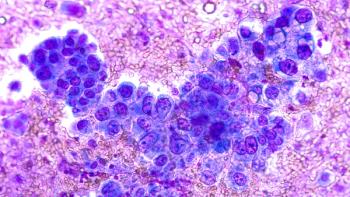
Olaparib Cuts Risk of Death 31% in BRCA 1/2 or ATM-Mutated Metastatic Castration-Resistant Prostate Cancer
Having biomarker-driven solutions in prostate cancer is important, because they have been lacking.
Olaparib cut the risk of death 31% for certain patients with metastatic castration-resistant prostate cancer (mCRPC) compared with those who received a novel hormonal therapy, according to final results of the PROfound trial presented Sunday at the European Society of Medical Oncology (ESMO) Virtual 2020 Congress.
At last year’s ESMO meeting, the PARP inhibitor olaparib was found to significantly improve progression-free survival (PFS) in patients with BRCA 1/2 or ATM-mutated mCRPC—which paved the way for FDA approval in May.
Sunday’s presentation by Joaquin Mateo, MD, sets olaparib (Lynparza, AstraZeneca/Merck) apart from the other PARP inhibitor approved for these patients, rucaparib (Rubraca, Clovis Oncology). It is approved for use with the FoundationOne CDx test to
Olaparib has already received a
PROfound was a randomized, open-label phase 3 trial that compared the safety and efficacy of olaparib with enzalutamide or abiraterone in mCRPC in 15 different predefined genes that have some role in homologous recombination repair (HRR); patients in the trial had already seen their disease progress on prior hormonal therapy. While biomarker-driven treatment with PARP inhibitors has advanced in breast and ovarian cancer, before PROfound’s initial results were announced last year, it had lagged in prostate cancer.
In results presented Sunday, men with BRCA1, BRCA2 or ATM-mutated cancers lived 19.1 months compared with 14.7 months for those treated with enzalutamideor abiraterone, although much of this was driven by the results from the BRCA mutations. A commentator emphasized that the results were somewhat hard to interpret after 66% of patients in the control arm were allowed to cross over into the olaparib arm after their disease progressed.
A second cohort of patients with the other 12 genes saw improvement in overall survival, but it did not reach the level of statistical significance.
Results were also published in the New England Journal of Medicine.
Biomarker-driven approach. About 1 in 9 men will develop prostate cancer, with most of them being over 65 years of age. Because prostate cancer is so common and the outcomes so poor if the disease is metastatic, finding a biomarker-driven treatment has been a welcome development, said Camille Hertzka, head of oncology US Medical Affairs at AstraZeneca, said in an interview with The American Journal of Managed Care®.
“In terms of interest on the data, we've heard a lot of very positive feedback, everybody was very excited to have this approval,” she said. “It means a lot for patients to have a new treatment option in prostate cancer in a situation where there were no biomarker driven approaches.…”
Hertzka noted that the overall survival data are in the second-line setting. “Being able to improve survival here is extremely impactful,” she said. These men “want to live longer.”
Are there more biomarkers to come? As noted in the ESMO discussion, some cancer-driving genes are rare, and the PROfound trial may simply not have had enough patients to determine if olaparib will work on other targets once tested over a larger population. Hertzka said that unanswered questions remain, and researchers will continue to look at both real-world data and the
Biomarker-driven research will continue, she said, “because it is important to understand who are the patients who benefit the most.”
Reference
Hussain M, Mateo J, Fizazi K, et al. Survival with olaparib in metastatic castration-resistant prostate cancer. N Engl J Med. Published online September 20, 2020. doi:10.1056/NEJMoa2022485
Newsletter
Stay ahead of policy, cost, and value—subscribe to AJMC for expert insights at the intersection of clinical care and health economics.








